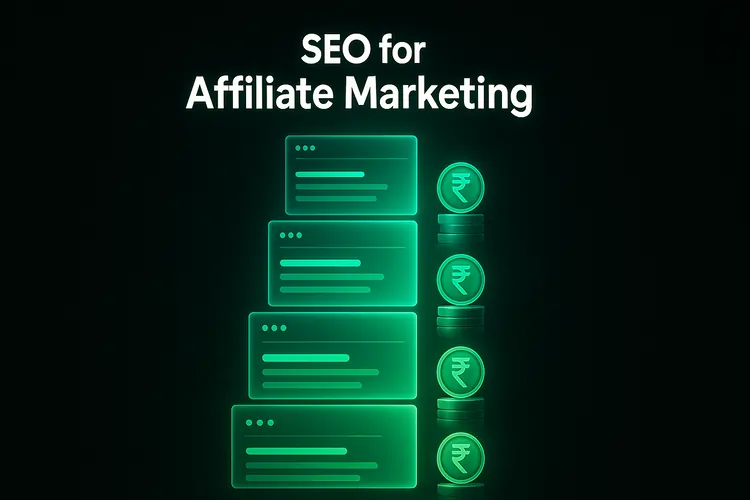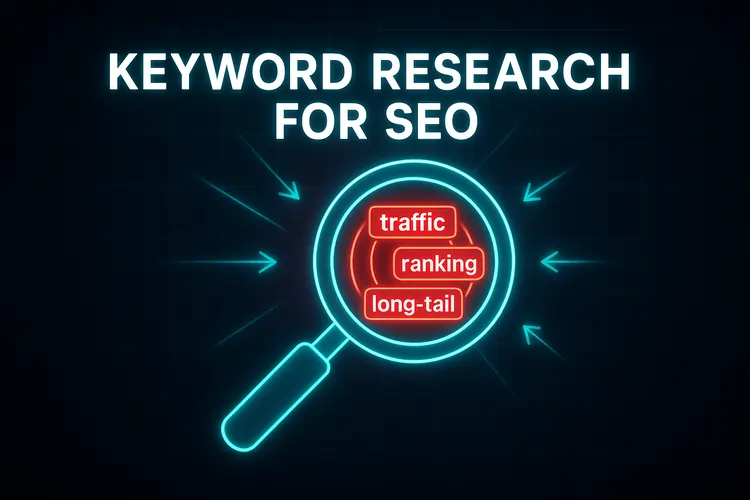SEO for affiliate marketing is the foundation that decides whether your site earns steady commissions or stays invisible. While paid ads drain money daily, SEO builds an engine of free, qualified traffic that compounds over time and fuels organic traffic growth.
Most affiliates in India skip SEO and wonder why sales don’t come. The reality? Google owns over 90% of search traffic here, and ranking for the right intent keywords is the only path to sustainable growth.
This guide gives you what others miss—India-first data, practical playbooks, and realistic timelines. Backed by Google Partner Digital Marketing Agency expertise at The DM School, it shows how even beginners can scale from ₹10K to ₹30K/month with SEO-driven affiliate funnels.
Summary: SEO for affiliate marketing drives free traffic, India-first growth, and consistent commissions with the right playbook.
Micro-Win: You now know why starting with SEO gives your affiliate site durable, compounding traffic.
What is SEO for Affiliate Marketing?
SEO for affiliate marketing means applying search engine optimization specifically to affiliate sites so that your product reviews, comparisons, or guides show up when buyers are actively searching. It’s the difference between waiting for random clicks and building predictable, organic traffic that converts into commissions.
Think of it as two layers: traditional SEO (keywords, content, links, speed) plus affiliate-specific focus like buyer intent keywords, trust signals, and policy compliance—executed through a repeatable workflow like our Ad Process for planning, publishing, and optimizing.
Summary: SEO for affiliate marketing optimizes affiliate sites to rank for buyer intent searches and generate commissions.
Micro-Win: You can now define affiliate SEO and see how it differs from standard blogging.
Why SEO Matters for Affiliate Marketing
SEO for affiliate marketing is not just a traffic strategy—it’s survival. Without SEO, affiliates depend on ads that eat profits or social platforms that change algorithms overnight. With SEO, every article you publish becomes a permanent asset that brings in leads and commissions for years.
In India, the affiliate market is booming. According to IAMAI, over 900 million internet users will be online by 2025, and a majority begin their product research on Google. That means ranking well is the only way to consistently reach intent-driven buyers who are ready to purchase.
Most affiliates chase quick hacks, but search engines reward depth, trust, and relevance. The difference between a ₹10K/month beginner and a ₹75K+/month pro often comes down to who invested in building SEO authority. That’s why The DM School integrates SEO into every funnel and Digital Marketing Agency services we run for clients.
For affiliates, SEO is leverage—turning each blog into a 24/7 salesperson. It doesn’t vanish when the ad budget stops, and it compounds as your site gains authority.
Summary: SEO matters in affiliate marketing because it delivers compounding, intent-driven traffic that grows commissions long term.
Micro-Win: You now know SEO is your most reliable channel for lasting affiliate sales in India.
Core Elements of SEO in Affiliate Marketing
SEO for affiliate marketing is built on the same fundamentals as traditional SEO, but with added focus on buyer intent and conversion. If you skip these basics, even the best content will fail to rank or generate commissions.
- Keyword Research: Target buyer intent phrases like “best under ₹10,000” instead of broad, generic terms. This ensures traffic with purchase intent.
- On-Page Optimization: Craft titles, meta descriptions, and structured headings around search intent. Use tools to track keyword positions, but never sacrifice readability.
- Content Depth: Google rewards in-depth content with clear answers, tables, and comparison lists. Thin content is the fastest way to lose rankings.
- Internal Linking: Affiliate sites that interlink reviews, guides, and case studies rank better. Use a structured flow like we teach in our Digital Marketing Mastery Masterclass.
- Link Building: Secure high-quality backlinks from blogs, news, and forums. Guest posts and collaborations often outperform paid links in long-term value.
- Site Speed & Mobile: More than 80% of India’s searches are mobile. A slow or clunky site bleeds traffic and affiliate revenue.
Missing any of these elements leaves revenue on the table. Competitors rarely explain how crucial internal linking and mobile speed are in the Indian market, but these can double your visibility faster than any hack.
Summary: Core SEO elements—keywords, content depth, links, and speed—make affiliate sites rank and convert better.
Micro-Win: You now know the essential building blocks of affiliate SEO that directly impact rankings and commissions.
What Are the Biggest SEO Challenges in Affiliate Marketing?
SEO for affiliate marketing looks simple on paper, but affiliates in India hit roadblocks that stall progress. These challenges explain why most sites never move past page two of Google.
- High Competition: Every niche has dozens of affiliates targeting the same buyer intent keywords. Without authority and unique angles, ranking is slow.
- Google Updates: Policy and algorithm shifts often hit affiliate-heavy sites first. Over-optimized or thin content is punished, while trustworthy brands get preference.
- Content Quality: Many affiliates churn out 500-word blogs with little depth. Google rewards structured guides, visuals, and data-rich content.
- Backlink Struggles: Earning quality backlinks is tough without strong branding. That’s why we use authority-building in our digital marketing case studies.
- Realistic Timelines: SEO doesn’t deliver overnight. For affiliate sites, expect 6–12 months before major rankings and revenue stability kick in.
The biggest mistake? Expecting SEO to behave like ads. Paid campaigns can deliver instant clicks, but organic SEO growth compounds over months and becomes unstoppable once momentum builds.
Summary: Affiliate SEO challenges include competition, Google updates, content quality, backlinks, and long ranking timelines.
Micro-Win: You now know the roadblocks to expect—and can plan ahead instead of quitting halfway.
Advanced SEO Strategies for Affiliate Marketing
SEO for affiliate marketing moves beyond basic on-page fixes once your site has the fundamentals in place. Advanced strategies separate small affiliates from those earning ₹75K–₹1.5L per month.
- Topical Authority: Instead of random product reviews, build complete content clusters. Cover buyer guides, FAQs, and comparison tables around one niche to show Google you’re the expert.
- Generative Engine Optimization (GEO): AI Overviews and chat-based search engines now influence visibility. Format your content with quick-answer boxes, summaries, and fact clusters so it’s AI-ready.
- Content Refresh Cycles: Google rewards updated content. Refresh posts every 90–120 days with new stats and examples—this alone can revive falling rankings.
- Schema & Rich Snippets: Add FAQ, HowTo, and Product schema to increase click-through rates. Most affiliate blogs ignore this edge.
- Authority Signals: Use testimonials, quote bombs, and EEAT strips to prove trust. We integrate these into every project at SEO Services Company in Delhi.
Few affiliate blogs in India talk about Generative Engine Optimization or structured refresh cycles. Mastering these early puts you ahead of the curve while others chase outdated hacks.
Summary: Advanced affiliate SEO means topical authority, GEO, refresh cycles, schema, and authority signals.
Micro-Win: You now know advanced tactics that prepare your affiliate site for 2025 and beyond.
Tools & Frameworks for Affiliate SEO
SEO for affiliate marketing becomes easier when you use the right tools. While content is king, data-driven insights and automation separate amateurs from professionals. Here are the top tools affiliates rely on, along with a simple framework to apply them.
| Tool | Best For | Free / Paid | Why It Matters |
|---|---|---|---|
| Ahrefs | Backlink analysis, competitor research | Paid | Shows where rivals get links so you can replicate. |
| SEMrush | Keyword research, technical SEO | Paid | One dashboard for tracking rankings, audits, and site health. |
| Ubersuggest | Affordable keyword ideas | Free + Paid | Beginner-friendly way to find buyer intent keywords. |
| Google Search Console | Performance tracking | Free | Shows which queries drive clicks and where to optimize. |
Avoid spreading thin across dozens of tools. Instead, apply the 80/20 principle: pick one keyword tool, one backlink tool, and stick to a framework like the one we teach in our Advanced Digital Marketing Course in Delhi.
Competitors rarely provide structured tool comparisons, which leaves readers guessing. This table makes your options clear in seconds.
Summary: Affiliate SEO tools like Ahrefs, SEMrush, and Ubersuggest simplify keyword research, backlinks, and tracking.
Micro-Win: You now have a clear toolkit and framework to run affiliate SEO with focus.
Quick Win Playbook: Apply SEO to Affiliate Marketing
SEO for affiliate marketing often feels overwhelming, but you don’t need to do everything at once. Here’s a practical 3-step playbook that you can execute this week to start building momentum.
- Niche Targeting: Pick one micro-niche (e.g., “best DSLR cameras under ₹50,000 in India”). Write a single, in-depth article targeting that exact phrase. This gets you faster wins than chasing broad keywords.
- On-Page Boost: Optimize the article’s title, meta description, H2s, and add a comparison table. Link it to a relevant resource, like our Digital Marketing Blog for structured learning.
- Internal Linking Push: Once published, connect the new article to at least 3 existing posts. Use anchors that match search intent, like product comparisons or buyer guides.
Each of these actions can be done in less than a week, yet they compound quickly. Most affiliates ignore these quick wins while chasing shiny tools—this is how you stay ahead.
Summary: A simple 3-step playbook—niche targeting, on-page boost, and internal linking—gets affiliates early SEO traction.
Micro-Win: You now have a one-week action plan to see real SEO progress without waiting months.
90-Day SEO Plan for Affiliate Marketers
SEO for affiliate marketing delivers results when you treat it like a project with timelines, not a random set of tasks. Here’s a 90-day roadmap to get your affiliate site moving towards rankings and revenue.
Days 1–30: Foundation
- Pick your micro-niche and validate with keyword research.
- Publish 3–5 cornerstone articles with at least 1,500 words each.
- Set up Google Search Console and analytics to track performance.
Days 31–60: Authority Building
- Expand into 5–7 supporting articles that interlink with your cornerstone content.
- Earn your first backlinks through guest posts and outreach.
- Add schema markup (FAQ, HowTo) to boost click-through rates.
Days 61–90: Optimization & Refresh
- Update your first articles with fresh stats and internal links.
- Double down on buyer-intent keywords that show impressions in Search Console.
- Scale publishing to 2+ articles per week with structured comparisons.
At the end of 90 days, your site won’t dominate every keyword—but you’ll see impressions, clicks, and possibly your first conversions. More importantly, you’ve built a system that can scale. For affiliates, this shift from “random posting” to a playbook-driven system is the difference between quitting and compounding.
For added depth, you can follow frameworks like those in our Digital Marketing Mastery Masterclass to stay consistent over the long term.
Summary: A 90-day plan builds foundations, authority, and refresh cycles for sustainable affiliate SEO growth.
Micro-Win: You now have a 3-month roadmap to start ranking and converting with affiliate SEO.
What Others Miss (and What You Get Here)
Most articles on SEO for affiliate marketing repeat the same surface-level tips. This guide is built differently. Here are four gaps in top-ranking content—and how we fill them for you.
- No AI-Focused SEO (GEO): Competitors ignore Generative Engine Optimization and AI Overviews. We show you how to format content for AI-driven search.
- No Quick Win Playbook: Others give theory, but we provide a one-week action plan you can execute now.
- No Realistic Timelines: Most guides skip how long SEO really takes. We set clear expectations—6–12 months for traction.
- No India-First Data: Global blogs rarely mention Indian internet growth. Here, you’ll see ₹ metrics and local case studies for relevance.
This isn’t about bashing competitors. It’s about giving you more. When you read here, you walk away with India-first insights, action-ready frameworks, and tools designed for affiliate growth in 2025.
Summary: This guide fills competitor gaps—AI SEO, quick wins, timelines, and India-first data—to deliver true information gain.
Micro-Win: You now see why this blog is worth your time over any generic SEO article.
Reality Check: Objections About SEO for Affiliate Marketing
Many beginners hesitate before committing to SEO for affiliate marketing. Let’s tackle the common objections head-on—because ignoring them only slows your growth.
- “SEO takes too long.”
True, SEO isn’t overnight. But traffic earned through organic rankings compounds month after month, unlike ads that stop the moment you pause spending. - “I can’t compete with big sites.”
Niche targeting lets small affiliates outrank giants. We’ve seen students win with micro-niches like “best smartphones under ₹20K,” proving authority beats size. - “I don’t know the technical stuff.”
Most wins come from content and internal links, not coding. Frameworks like our Advanced Digital Marketing Course simplify the process step by step.
These objections are real—but they’re also solvable. Treat them as checkpoints, not roadblocks, and you’ll keep progressing while others give up.
Summary: SEO challenges exist, but with niche focus, compounding traffic, and frameworks, they become solvable steps.
Micro-Win: You now know objections are not barriers—just signals to refine your affiliate SEO path.
Conclusion: Your Next Step in SEO for Affiliate Marketing
SEO for affiliate marketing is no longer optional—it’s the growth engine that separates affiliates earning ₹10K/month from those scaling beyond ₹1 lakh. By now, you’ve learned the foundations, advanced strategies, and even a 90-day roadmap to start ranking.
Here’s the truth: most people will read this and do nothing. The difference between “I tried” and “I earn” is consistent execution. That’s why at The DM School, we’ve trained over 1 lakh students and built proven SEO funnels that actually convert.
“SEO is not about chasing algorithms—it’s about building authority that Google can’t ignore.”
Ready to apply this? Let’s work together. Our team can help you build affiliate funnels, optimize for Google’s latest updates, and hit real revenue milestones.
📞 Book Your Free Strategy Call
Summary: SEO for affiliate marketing scales income only if you act consistently with proven systems.
Micro-Win: You now have the confidence, frameworks, and next step to make SEO your affiliate advantage.
Frequently Asked Questions (FAQs) on SEO for Affiliate Marketing
1. What is SEO for affiliate marketing?
SEO for affiliate marketing is the process of optimizing your affiliate site so it ranks on Google for buyer-intent keywords. Instead of relying on ads or random social shares, SEO ensures your reviews, comparisons, and guides appear when users actively search for products. For affiliates, this means a sustainable traffic source that keeps generating commissions month after month.
2. How long does it take to see results from SEO in affiliate marketing?
Most affiliate marketers in India start seeing impressions and clicks within 90 days if they follow a structured content plan. However, real rankings for competitive keywords typically take 6–12 months. The good news is SEO results compound—once your content starts ranking, traffic and commissions grow without extra ad spend.
3. Can I do affiliate marketing SEO without spending money?
Yes, you can start with almost zero investment by using free tools like Google Search Console, Ubersuggest (limited free tier), and basic keyword research techniques. Your main investment is time—writing quality content and building backlinks through outreach. Many beginners in India grow from ₹10K to ₹30K per month using free SEO strategies before upgrading to premium tools.
4. What are the best SEO practices for affiliate websites?
The best practices include targeting long-tail buyer-intent keywords, creating comparison tables, publishing in-depth guides, and using internal linking. Adding schema markup, optimizing for mobile speed, and regularly refreshing content also improve rankings. Most importantly, write for readers first, not just algorithms, because Google rewards trust and expertise.
5. How much can I earn from SEO affiliate marketing in India?
Income depends on niche, traffic, and execution. Beginners typically earn ₹10K–₹30K/month after 6–12 months. Intermediate affiliates who scale content and backlinks can reach ₹30K–₹75K/month. Advanced marketers with authority sites and high-ticket programs often cross ₹1 lakh+ per month. The key driver is consistent SEO traffic that doesn’t rely on paid ads.
6. Is SEO better than paid ads for affiliate marketing?
SEO and paid ads serve different purposes. Ads give instant clicks but stop once the budget runs out. SEO takes longer but creates long-term traffic that compounds. In India, where CPC rates are rising, SEO gives affiliates a bigger ROI. Many successful affiliates use both: SEO for compounding traffic and ads for short-term launches.
7. Do I need technical skills to do SEO for affiliate marketing?
Not at all. Most SEO wins come from content creation, keyword research, and internal linking—none of which require coding. Technical tasks like adding schema or improving speed can be done with WordPress plugins. Many students from our Advanced Digital Marketing Course start with zero technical background and still succeed with affiliate SEO.
8. Which niches work best for affiliate SEO in India?
Popular niches include smartphones, laptops, personal finance, fitness, and beauty. However, the “best” niche is one where you can provide depth and authority. For example, instead of “electronics,” focus on “budget smartphones under ₹20K.” Micro-niches with high buyer intent and growing search volume deliver faster SEO wins.
9. How to start SEO for affiliate marketing in India?
Begin by picking a micro-niche and validating search demand. Write 3–5 cornerstone articles targeting buyer keywords, then add supporting content. Optimize titles, meta descriptions, and internal links, and track results in Google Search Console. Over 90 days, follow a plan like the one in this guide to start gaining traction. For faster progress, you can join our Digital Marketing Mastery Masterclass for structured frameworks.
Affiliate SEO works—but it scales best within a full-funnel strategy. Ready to go beyond content monetization and boost brand visibility and traffic across India? Partner with a trusted SEO Company in India to power sustainable results and long-term ROI.


